
Stratigraphy
Scope & Guideline
Exploring the Depths of Geological Time
Introduction
Aims and Scopes
- Stratigraphic Nomenclature and Classification:
The journal emphasizes the importance of standardized stratigraphic nomenclature, promoting clarity and consistency in the classification of geological units, as evidenced by reports addressing culturally sensitive names. - Biostratigraphy and Paleontology:
Research often focuses on biostratigraphic techniques utilizing microfossils, such as foraminifera and nannofossils, to establish chronological frameworks and understand past biological conditions. - Sequence Stratigraphy:
A significant aspect of the journal is the exploration of sequence stratigraphy, which analyzes sedimentary deposits in relation to changes in sea level and tectonics, providing insights into depositional environments. - Paleoenvironmental Analysis:
Studies frequently include paleoenvironmental reconstructions, integrating sedimentological, geochemical, and paleontological data to understand ancient ecosystems and their evolution. - Regional and Global Stratigraphic Studies:
The journal covers stratigraphic research on both regional and global scales, examining various geological settings from the Cambrian to the Quaternary periods, which enhances the understanding of geological history.
Trending and Emerging
- Culturally Sensitive Stratigraphy:
An emerging trend is the focus on culturally sensitive stratigraphic nomenclature, as seen in reports advocating for the use of Indigenous place names, highlighting the intersection of geology with cultural awareness. - High-Resolution Stratigraphy:
There is a growing emphasis on high-resolution stratigraphic frameworks, particularly in 3D seismic data analysis, which enhances the precision of geological interpretations and applications. - Microfossil Biostratigraphy:
Research on microfossils, especially calcareous nannofossils and foraminifera, is gaining traction, reflecting their crucial role in biostratigraphy and paleoenvironmental reconstructions. - Climate Change Impact Studies:
Recent articles appear to increasingly address the impacts of climate change on geological processes and stratigraphic records, underscoring the relevance of stratigraphy in understanding contemporary environmental issues.
Declining or Waning
- Sedimentology of Older Geological Periods:
There seems to be a decrease in studies focused on sedimentological analyses of older geological periods, such as the Paleozoic, possibly due to a growing interest in more recent stratigraphic frameworks. - Non-biostratigraphic Techniques:
Research utilizing non-biostratigraphic methods, such as purely lithostratigraphic or chemostratigraphic approaches, appears to be less frequent, indicating a potential shift towards biostratigraphic methodologies. - Geochemical Stratigraphy:
Although still relevant, the exploration of geochemical stratigraphy, particularly in relation to paleoenvironmental conditions, seems to be less emphasized in recent publications.
Similar Journals

NORWEGIAN JOURNAL OF GEOLOGY
Shaping the Future of Geology Through Collaboration.NORWEGIAN JOURNAL OF GEOLOGY, published by the Geological Society of Norway, stands as a vital resource in the fields of geology, geochemistry, petrology, geophysics, oceanography, and paleontology. Since its transition to an Open Access model in 2015, this journal has significantly expanded its reach, allowing for greater dissemination of cutting-edge research and insights. With an ISSN of 2387-5844 and E-ISSN of 2387-5852, the journal is committed to fostering collaboration and knowledge exchange among the scientific community. The journal's categorization in the Q3 quartile across various Earth and Planetary Sciences fields underscores its status as a reputable publication, offering researchers, professionals, and students alike a platform to share their findings and advancements in geology. Continuing through its converged years from 2015 to 2024, the NORWEGIAN JOURNAL OF GEOLOGY plays a crucial role in enhancing our understanding of Earth's processes and materials, making it an important reference for anyone engaged in geoscientific research.

CARBONATES AND EVAPORITES
Exploring the Depths of Geochemical InsightsCARBONATES AND EVAPORITES is a distinguished peer-reviewed journal published by Springer, with a dedicated focus on the geochemical and petrological aspects of carbonates and evaporite minerals. Since its inception in 1986, the journal has served as a vital platform for disseminating high-quality research, contributing significantly to the understanding of these essential geological formations. With an impressive Scopus ranking in the 49th percentile and categorized in the Q3 quartile for Geochemistry and Petrology in 2023, it stands as a credible source for both researchers and professionals in the field. The journal is committed to publishing original research articles, reviews, and technical notes that enhance knowledge and foster discussion in the community. Although not an open-access publication, it continues to provide critical insights and findings that influence advancements in Earth and planetary sciences. Operating from its base in Germany, the journal is poised for continued relevance as it approaches the convergence year of 2024, inviting contributions that explore the richness of carbonate and evaporite studies.
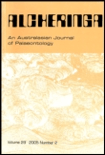
ALCHERINGA
Fostering Insights in Ecology, Evolution, and BeyondALCHERINGA, published by Taylor & Francis Ltd, is a distinguished academic journal that has been at the forefront of research in the fields of ecology, evolution, behavior, systematics, and paleontology since its inception in 1975. With an ISSN of 0311-5518 and E-ISSN 1752-0754, this journal serves as a critical platform for the dissemination of high-quality research, contributing significantly to the understanding of biological and geological sciences. Ranking in the Q3 quartile for both Ecology, Evolution, Behavior and Systematics, as well as Paleontology, ALCHERINGA is well-positioned within the academic community, attracting submissions from researchers across the globe. The journal's Scopus ranks further highlight its relevance, particularly its position in the 51st percentile for Ecology and the 50th percentile for Paleontology. Although it does not operate under an open access model, ALCHERINGA remains committed to providing valuable insights and fostering discussions that are essential for the advancement of these vital scientific disciplines. Researchers, professionals, and students are encouraged to explore the profound implications of the studies published within, making it an indispensable resource for anyone aiming to deepen their expertise in these fields.

Palaeobiodiversity and Palaeoenvironments
Exploring the Depths of Past Biodiversity.Palaeobiodiversity and Palaeoenvironments, published by SPRINGER HEIDELBERG, is a distinguished academic journal that focuses on the intricate intersections of paleontology, ecology, and geology. With a strong commitment to advancing research in these fields, the journal maintains a notable impact factor and successfully ranks in the second quartile (Q2) in renowned categories including Ecology, Evolution, Behavior and Systematics, and Geology, providing significant visibility to contemporary research endeavors. Spanning a publication timeline from 2010 to 2024 and indexed under the respected Scopus database, it features a diverse array of articles that address the complexities of past biodiversity and ecosystems. Positioned within Germany's vibrant academic landscape, this journal appeals to a broad readership of researchers, professionals, and students who are eager to uncover the historical narratives of our planet’s life forms and their environments.
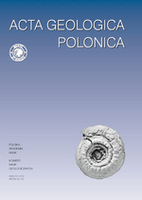
ACTA GEOLOGICA POLONICA
Pioneering discoveries in geology and beyond.ACTA GEOLOGICA POLONICA is a distinguished journal published by the Polska Akademia Nauk, in collaboration with the University of Warsaw's Geology Department. Since its inception, it has served as a vital platform for disseminating innovative research in the field of Geology, reflecting a commitment to advancing scientific knowledge in Earth and planetary sciences. With an ISSN of 0001-5709 and an E-ISSN of 2300-1887, this journal provides a rigorous review process and is classified in the Q3 quartile for Geology as of 2023, indicating its growing influence in the discipline. Despite not being open access, the journal facilitates meaningful contributions that span a range of geological topics from fundamental research to applied sciences, thereby enriching the academic landscape. Researchers, professionals, and students alike are encouraged to engage with the valuable findings and discussions contained within its pages, which continue to shape the future of geological inquiry.
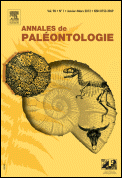
ANNALES DE PALEONTOLOGIE
Bridging the Gap Between Past and PresentANNALES DE PALEONTOLOGIE is a distinguished academic journal published by MASSON EDITEUR that plays a pivotal role in the field of paleontology. With an ISSN of 0753-3969 and an E-ISSN of 1778-3666, this journal has been a vital resource since its inception in 1988, continuously contributing to the advancement of knowledge in Earth and Planetary Sciences, particularly focusing on paleontological research. Currently ranked #68 out of 113 in its category by Scopus, and celebrated for its Q2 quartile standing, ANNALES DE PALEONTOLOGIE publishes innovative studies, reviews, and discussions that appeal to a diverse audience of researchers, professionals, and students. The journal aims to foster a deeper understanding of paleontological phenomena and encourages interdisciplinary collaboration within the scientific community. Although it is not an open access journal, its commitment to scholarly excellence ensures that the content is highly regarded and widely referenced in academic circles. Situated in Issy-les-Moulineaux, France, it continues to maintain a global readership while promoting significant advancements in paleontological research.

Palaeoworld
Uncovering the Secrets of Life Through TimePalaeoworld is a leading peer-reviewed journal published by ELSEVIER, focusing on the dynamic and interdisciplinary fields of paleontology, ecology, and stratigraphy. Established in 2006, the journal aims to facilitate the dissemination of innovative research and significant discoveries that enhance our understanding of past life on Earth. With an impressive impact factor and categorized in the second quartile (Q2) for Ecology, Evolution, Behavior and Systematics, Paleontology, and Stratigraphy in 2023, Palaeoworld stands out in its commitment to high-quality scholarship. The journal is indexed in Scopus, ranking #23 in Paleontology and #14 in Stratigraphy, placing it within the top 20% of publications in these categories. As a valuable resource for researchers, professionals, and students alike, it provides unrestricted access to cutting-edge findings, detailed methodologies, and critical assessments of paleo-environmental data. This journal is not only a repository of knowledge but also a platform for advancing discussions that bridge past ecological patterns with contemporary issues.
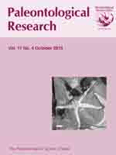
PALEONTOLOGICAL RESEARCH
Advancing Knowledge in Paleontology and Ecology.PALEONTOLOGICAL RESEARCH, published by the PALAEONTOLOGICAL SOCIETY OF JAPAN, is a prominent peer-reviewed journal that addresses key developments in the field of paleontology, ecology, and evolutionary biology. With an ISSN of 1342-8144, this journal has established itself as a vital resource for researchers and professionals who seek to explore the intricate history of life on Earth, integrating insights into evolutionary dynamics and ecological frameworks. Operating since 1997 and with content converging up to 2023, PALEONTOLOGICAL RESEARCH occupies a notable position, ranked in the second quartile within both Ecology, Evolution, Behavior and Systematics and Paleontology categories. While it is not an open-access journal, its rich repository of studies significantly contributes to the academic community. Researchers and students engaged in the exploration of ancient ecosystems and their implications for current biodiversity are sure to find valuable insights within its pages, reinforcing the journal's importance as a leading platform for disseminating paleontological knowledge in Japan and beyond.
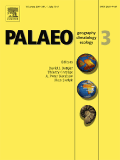
PALAEOGEOGRAPHY PALAEOCLIMATOLOGY PALAEOECOLOGY
Decoding the Past to Inform Tomorrow's Climate ChallengesPalaeogeography, Palaeoclimatology, Palaeoecology, published by Elsevier and accessible via ISSN 0031-0182 (print) and E-ISSN 1872-616X (online), stands as a pivotal journal in the fields of Earth-Surface Processes, Ecology, Evolution, Behavior and Systematics, Oceanography, and Paleontology. With an impressive Impact Factor and ranking in the top quartile (Q1) across multiple categories, this journal facilitates cutting-edge research that explores the intricate relationships between past climates, environments, and ecosystems. Its scope encompasses a wide array of studies focusing on the geological and biological records that inform our understanding of contemporary ecological dynamics. Key objectives include advancing knowledge in palaeoecology and enriching discourse around climate change through rigorous research contributions. The journal's dedicated commitment to publishing high-quality, peer-reviewed articles makes it an invaluable resource for researchers, professionals, and students alike, providing insights essential for probing the factors shaping our planet's history. Positioned in the Netherlands and continuing its tradition of excellence since 1965, the Palaeogeography, Palaeoclimatology, Palaeoecology journal remains at the forefront of interdisciplinary research that bridges the past and future.
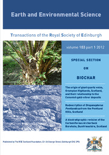
Earth and Environmental Science Transactions of the Royal Society of Edinburgh
Championing excellence in Earth and environmental research.Earth and Environmental Science Transactions of the Royal Society of Edinburgh is a prestigious journal published by Cambridge University Press, dedicated to advancing research in the field of Earth and planetary sciences, as well as environmental science. With its ISSN 1755-6910 and E-ISSN 1755-6929, the journal has established itself as a crucial platform for disseminating innovative research and comprehensive reviews since its inception in 2007. Positioned in the Q3 quartile for both Earth and Planetary Sciences and Environmental Science, it contributes significantly to the ongoing dialogue and development in these areas, boasting a Scopus ranking that reflects its commitment to scholarly excellence with an emphasis on interdisciplinary approaches and real-world applications. The journal is based in the United Kingdom, with its editorial office located at the Edinburgh Building, Shaftesbury Road, Cambridge. As an essential resource for researchers, professionals, and students alike, Earth and Environmental Science Transactions offers opportunities for open discourse on pressing environmental challenges, fortifying its role in fostering a deeper understanding of our planet's systems and their interconnectedness.